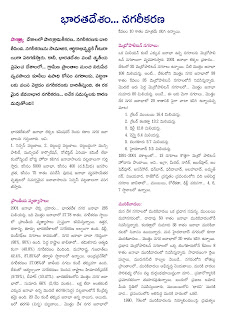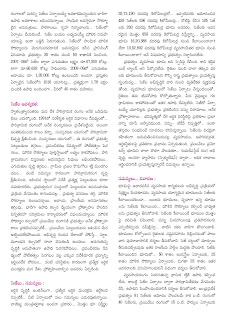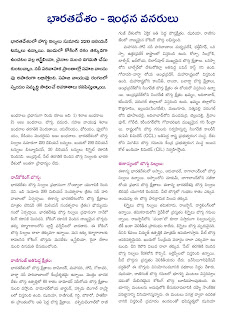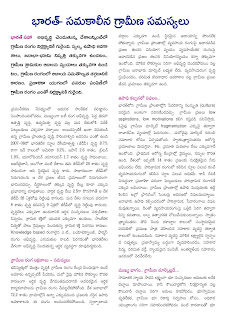Pages
- Home
- Exam Results To Be Announced
- ENGLISH CLASS
- Banking Awareness
- General Knowledge
- Computer Terms & Abbreviations
- Banking Terms And Abbreviations
- Interview Tips
- syllabus
- Geography MP3 FILES
- All India Police/Defence Jobs
- Railway Jobs
- Latest Exam Results Announced
- Examwise Information
- Upcoming Notifications
- political Science MP3 FILES
- Physcial Science MP3 FILES
- Indian History MP3 FILES
- Indian Economy MP3 FILES
- General Knowledge MP3 FILES
- A.P. History MP3 FILES
- A.P. Economy MP3 FILES
- BIOLOGY MP3 FILES
Tuesday 27 December 2016
Daily Quiz 1
Daily Quiz 1
1. The recently conducted fourth Nuclear Security Summit is held atA. Washington
B. New York
C. Sydney
D. Geneva
ఇటీవల నిర్వహించిన నాల్గవ విడి సెక్యూరిటీ సమ్మిట్ ఎక్కడ జరుగుతుంది
A. వాషింగ్టన్
బి న్యూ యార్క్
సి సిడ్నీ
డి జెనీవా
2. 13th India – EU Summit is held in
A. New Delhi
B. Brussels
C. Hague
D. Mumbai
13 వ భారతదేశం - EU సమ్మిట్ ఎక్కడ జరుగుతుంది
A. న్యూ ఢిల్లీ
బి బ్రస్సెల్స్
సి హాగ్
డి ముంబై
3. The recently concluded Logistics Exchange Memorandum of Agreement (LEMOA) is between
A. India - Russia
B. India – China
C. India – USA
D. India – Srilanka
3. లాజిస్టిక్స్ ఎక్స్చేంజ్ ముసాయిదా (LEMOA) ఏ దేశాల మధ్య కుదిరింది
A. భారతదేశం - రష్యా
బి భారతదేశం - చైనా
సి భారతదేశం - USA
డి భారతదేశం - శ్రీలంక
4. International Yoga Day is celebrated on
A. 21st December
B. 22nd September
C. 23rd July
D. 21st June
4. అంతర్జాతీయ యోగ డే ఏ రోజున జరుపుకుంటారు
A. 21 డిసెంబర్
బి 22 సెప్టెంబర్
సి 23 జూలై
డి 21 జూన్
5. Theme of World Health Day for the year 2016 is
A. Beat HIV
B. Beat Cancer
C. Beat Diabetes
D. Beat Smallpox
5.2016 ప్రపంచ ఆరోగ్య దినోత్సవం ఈ థీమ్ తో జరుపబడింది
A. బీట్ హెచ్ఐవి
బి క్యాన్సర్ బీట్
సి బీట్ డయాబెటిస్
డి బీట్ మశూచి
6. Indian Navigation system NAVIC is the new name for
A. GSLV
B. PSLV
C. IRNSS
D. Reusable Launch Vehicle
6. భారత నావిగేషన్ వ్యవస్థ NAVIC దీనికి కొత్త పేరు
A. GSLV
బి పిఎస్ఎల్వి
సి ఐఆర్ఎన్ఎస్ఎస్
డి పునర్వినియోగ లాంచ్ వెహికల్
7. The 2016 World Ayurveda Congress has held in which city of India
A. Kolkata
B. Bangalore
C. Chennai
D. Jaipur
7. భారతదేశం లోని ఏ నగరం లో 2016 వరల్డ్ ఆయుర్వేదం కాంగ్రెస్ జరిగాయి
A. కోలకతా
బి బెంగుళూర్
సి చెన్నై
డి జైపూర్
8. Which state government has launched Purse Mobile App?
A. Karnataka
B. Tamil Nadu
C. Maharashtra
D. Andhra Pradesh
8. ఏ రాష్ట్ర ప్రభుత్వం పర్స్ మొబైల్ App ప్రారంభించింది?
A.కర్ణాటక
బి తమిళనాడు
సి మహారాష్ట్ర
డి ఆంధ్ర ప్రదేశ్
9. Who has been named as the Time magazine’s Person of the Year 2016?
A. Donald Trump
B. Mark Zuckerberg
C. Barak Obama
D. Narendra Modi
9. ఎవరు ఇయర్ 2016 టైమ్ మ్యాగజైన్ పర్సన్ గా ఎన్నుకోబడ్డారు?
A. డోనాల్డ్ ట్రంప్
బి మార్క్ జకర్బర్గ్
సి బరాక్ ఒబామా
డి నరేంద్ర మోడీ
10. The state with largest coastline in India is ?
A. West Bengal
B. Tamil Nadu
C. Gujarat
D. Andhra Pradesh
భారతదేశం లో అతిపెద్ద తీర ప్రాంత ఏ రాష్ట్రంలో ఉంది ?
A. వెస్ట్ బెంగాల్
బి తమిళనాడు
సి గుజరాత్
డి ఆంధ్ర ప్రదేశ్
Answers:-
(1) A (2) B (3) C (4) D (5) C (6) C (7) A (8) D (9) A (10) C
Important Judgements for Indian Polity
Landmark judicial decisions changed the Constitution as well as everyday life. Their impact still echoes.
Champakam DorairajanVsState of Madras 1951Well before Arjun Singh, this case concerning admissions of backward classes to educational institutions led B.R. Ambedkar, then the law minister, to pilot the first-ever amendment to the Constitution. Berubari Case 1960 Berubari case was the Presidential Reference Under Art. 143(1) of the Constitution of India on the implementation of the Indo-Pak agreement relating to Berubari union and exchange of enclaves which come up for consideration by a bench consisting of eight judges headed by B.P.Sinha, C.J. Justice Gajendragadkar delivered the unanimous opinion of the court. Quoting story, the eminent Constitutional jurist, the court held that the Preamble to the Constitution containing the declaration made by the people of India in exercise of their sovereign will, no doubt is “a key to open the minds of framers of the Constitution” which may show the general purposes for which they made the several provisions in the Constitution but nevertheless the Preamble is not a part of the Constitution K.M. Nanavati VsState of Maharashtra1960The crime of passion, where Commander Kawas Maneckshaw Nanavati murdered his wife's lover, marked the end of jury trials in India when the officer was let off. GolaknathVsState of Punjab 1967The Supreme Court made fundamental rights immune from amendment until Parliament reasserted its authority in 1971 by amending Articles 13 and 368 of the Constitution. Madhav JiwajiRao Scindia VsUnion of India1970The Supreme Court rejected a 1970 presidential order abolishing titles, privileges and privy purses of India's erstwhile princely rulers. Kesavananda BharatiVsState of Kerala1973In 1971, Parliament empowered itself to amend any part of the Constitution. However, the Supreme Court laid down that such amendments could not destroy the 'basic structure' of the Constitution-fundamental rights are part of the 'basic structure'. Himmat Lal ShahVsCommissioner of Police1973It dealt with a common citizen's right to hold public meetings on streets and the extent to which the state could regulate this right. Courtroom Drama Indira GandhiVsRaj Narain1975Indira Gandhi declared Emergency after being ordered by the Allahabad High Court to vacate her seat for malpractice. The Supreme Court later overturned the decision. A.D.M. JabalpurVsS. Shukla1976The Supreme Court declared the right to move court under Articles 14, 21 and 22 would remain suspended during the Emergency. Maneka GandhiVs Union of India1978The case caused a huge uproar over the definition of freedom of speech.The court ruled that the procedure must be fair and the law must not violate other fundamental rights. Minerva MillsVsUnion of India 1980The Supreme Court again applied the 'basic structure' theory, saying that social welfare laws could not curb fundamental rights. Ramesh DalalVsUnion of India1988The case dealt with the subject of pre-Partition communal violence, and how its depiction was not in violation of Constitutional articles. Rajan Case1981Involving the torture and death of a final year engineering student in custody in Kerala, the case led to the resignation of K. Karunakaran, then the home minister, and imprisonment of the officers accused. Kehar SinghVsDelhi Administration1984Kehar Singh was accused of taking part in the murder of Indira Gandhi. Though the death sentence was upheld by the Supreme Court, its accuracy has often been questioned. Babri Masjid, Ayodhya Case1994The case questioned the Constitutional validity of the acquisition of a certain area adjoining the disputed site. The Supreme Court upheld status quo on the disputed structures. Best Bakery Case2006The controversial trial came to an end with the conviction of nine people. The case related to 14 deaths in an arson attack on the Best Bakery in Vadodara in 2002. A retrial was ordered in 2004 after a local court acquitted all 21 accused. Shah Bano Case1985The case, related to the issue of Muslim personal law, caused a furore as the court awarded Shah Bano a maintenance allowance after divorce. Courtroom Judgment Indira SawhneyVsUnion of India1992The Supreme Court upheld the implementation of recommendations made by the Mandal Commission. It also defined the "creamy layer" criteria and reiterated that the quota could not exceed 50 per cent. St. Stephen's CollegeVsUniversity of Delhi1992The identity of St. Stephen's College as a minority-run institution was put under the scanner as it was receiving grant-in-aid from the Government. The court ruled that grants could not change the minority character of an institution. S.R. BommaiVs Union of India 1994The case laid down the guidelines in proving a majority under Article 356. The recent Arjun Munda case judgement was also passed with reference to the Bommai case. R. Rajagopal VsState of Tamil Nadu1994The case decided that the right to privacy subsisted even if a matter became one of public record. The right to be let alone is part of personal liberty. P.A. Inamdar VsState of Maharashtra2005The Supreme Court stated that "neither the policy of reservation can be enforced by the state nor any quota of admissions be carved out in private educational institutions". Sarla Mudgal Vs Union of India 1995The Supreme Court held that a second marriage solemnised while the first existed was a punishable offence, though it did not become null and void. Jamaat-e-Islami HindVsUnion of India1995The association was banned for unlawful activities. But the decision was reversed due to lack of evidence. Ministry of I&BVsCricket Association of Bengal1995The case, which dealt with the broadcast of the Hero Cup, was the first tussle involving the telecast of an international event by a private broadcaster. VishakaVsState of Rajasthan1997For the first time, sexual harassment, including sexually coloured remarks and physical contact, was explicitly and legally defined as an unwelcome sexual gesture. It stated that every instance of sexual harassment is a violation of fundamental rights. Samatha VsState of AP1997The Supreme Court said government land, tribal land, and forest land in scheduled areas could not be leased to non-tribals or private companies for mining or industrial operations. Such activity can only be done by tribal people or by a government undertaking. Rupan Deol BajajVsK. P. S. Gill1998K.P.S. Gill, former chief of Punjab Police, was fined Rs 2.5 lakh in lieu of three months' rigorous imprisonment for slapping senior IAS officer Rupan Deol Bajaj on the posterior. Representation of the People (Amendment) Act2002The judgement of a three-member Bench ordered candidates contesting elections to declare their assets and all criminal cases pending against them at the time of filing of nominations. Tamil NaduVsSuhas Katti 2004The first case involving conviction under the Information Technology Act, 2000, related to the posting of obscene messages on the Internet. Om Prakash VsDil Bahar2006
In a severe deterrent to incidents of rape, the Supreme Court held that a rape accused could be convicted on the sole evidence of the victim, even if medical evidence
Subscribe to:
Posts (Atom)
































































































































































